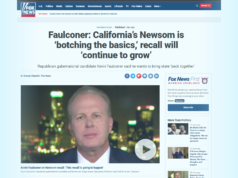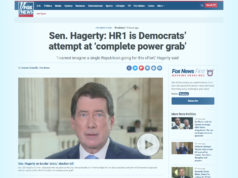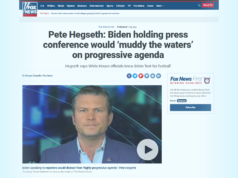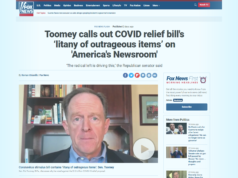“I need loyalty.”
“You will always get honesty from me.”
“Honest loyalty.”
“You’ll get that from me.”
The above is FBI Director James Comey’s recollection of a conversation with President Trump. A conversation Trump denies ever took place.
Just weeks after President Trump’s inauguration, Comey was invited to what he expected to be a group dinner. This was not the case, as he soon discovered what he calls “a table unmistakably set for two,” a table where his ability to serve President Trump would soon be called into question. During the dinner, Comey alleges that Trump asked for unwavering loyalty, something Comey felt he was unable to give.
Months later, during a visit to the FBI’s Los Angeles field office, Comey caught a glimpse of a television graphic informing him of his firing by President Trump. Comey’s career was, in his own words, “over in a flash.”
For Comey, someone whose career has rested on the laurels of justice and public service, these events were far outside the realm of expectation. Comey was appointed FBI Director in 2013, and he had intended to serve the standard ten-year term. Unbeknownst to him was the series of controversial events that would play out over the next few years, events in which he would play a pivotal role.
James Comey, who was described by ABC News Anchor George Stephanopoulos as a “polarizing man for a polarizing time,” calls the current state of affairs “a dangerous time for our country.” In “James Comey – An ABC News Exclusive Event Interview,” Stephanopoulos asks Comey about why he believes this to be the case. The hour-long special gives Comey the platform to explain his role before, during, and after what Stephanopoulos calls an election between “two celebrities with unusual baggage.”
Perhaps the most prominent example of “baggage” during the campaign came in the form of Hillary Clinton’s emails. In the months leading up to the election, Clinton’s use of a private email server was being investigated by the FBI in what Comey calls “a competent and independent way.” Clinton’s supporters, and even Clinton herself, may see it differently.
The initial investigation was closed after the FBI found no criminal intent and had no reason to prosecute. Comey then decided to reopen the investigation after discovering additional emails on the home computer of Anthony Weiner, a former congressman and ex-husband of a top Clinton aide. He subsequently sent a letter to Congress confirming this on October 28, 2016, eleven days before the presidential election.
Though the Clinton investigation was completely visible to the American public before the election, the FBI was also privately investigating the Trump campaign’s possible connections to Russia. Many argue that the concealment of the Trump investigation, coupled with the publicity of the Clinton investigation, heavily influenced the outcome of the election.
When asked whether he would still send the letter to Congress had he known Trump would have been elected, Comey answered “I would.” He believes that sending the letter “really was the right thing to do.”
Comey did not vote in the 2016 election. He believed that, as FBI Director, he should try to stay “outside of politics.”
After the election, Comey quickly realized that staying “outside of politics” would be impossible.
During the interview, Comey rhetorically asks “If we lose tethering of our leaders to the truth, what are we?” This question illustrates Comey’s main concerns about President Trump, who Comey says “is someone for whom the truth is not of high value.” Over the months following the election, Comey states that he got to see more and more of Trump’s true character.
In his first meeting with Trump, Comey recalls feeling nervous that Trump “could be volatile.” His first impression of Trump: a man with hair that “looks to be all his” and “must take a lot of time in the morning,” skin that “looked slightly orange up close,” and “white half-moons under his eyes which [Comey assumes] are from tanning goggles.”
“If we lose tethering of our leaders to the truth, what are we?” -James Comey
The meeting, which took place at Trump Tower, was convened in response to Russian meddling in the 2016 election. According to Comey, it consisted of members of the Trump team asking “how [they] would position [the meddling], and what they could say about this,” instead of focusing on “what’s coming next” and “how might [they] stop it.”
After this meeting, Comey was tasked with briefing Trump on “allegations of [Trump] being involved with prostitutes in Moscow.” Comey recalls that, during this conversation, Trump became “very defensive.” In the end, Comey was left wondering whether the allegations were true.
In the interview, Comey states, “I don’t know whether the current president of the United States was with prostitutes peeing on each other in Moscow in 2013.”
Weeks later, on February 13, 2017, Trump’s National Security Adviser Michael Flynn was fired after lying about having contacts with Russian operatives prior to the election. A meeting of top federal officials was held the next day. During the meeting, Trump asked almost everyone in the room, including Vice President Mike Pence and Attorney General Jeff Sessions, to leave. Trump wanted to speak to one person in particular.
Once again, Comey had found himself face-to-face, one-on-one with the president.
During this meeting, Comey alleges that Trump said “I hope you can let it go,” in reference to the investigation into Flynn’s contact with Russians.
Stephanopoulos asked Comey if, in this moment, President Trump was obstructing justice. Comey replied, “Possibly.” Furthermore, when asked whether he believes the Russians have any damaging information on Trump, Comey says “It’s possible.”
“I don’t know whether the current president of the United States was with prostitutes peeing on each other in Moscow in 2013.” -James Comey
In the midst of these unanswerable questions, Comey claims with certainty that President Trump, who Comey believes “sees moral equivalencies in Charlottesville” and “treats women like they’re pieces of meat,” is “morally unfit to be president.” His final remark? “Values matter. This President does not reflect the values of this country.”
Comey’s tell-all book, A Higher Loyalty, will be available starting tomorrow, April 17th.
###








